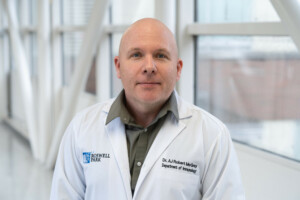2015 Mentored Investigator Grant Recipient — Bob McGray, PhD
Project Summary
Researchers are currently investigating novel cancer treatments that act to instruct the immune system to efficiently seek out and destroy tumor cells in the body, known collectively as cancer immunotherapies. One such therapy involves the use of a patient’s own T cells, a type of immune cell that, when properly directed, is able to recognize and destroy tumor cells in the body. T cells can be isolated from an individual, with tumor- recognizing T cells expanded to very high numbers outside the body prior to infusion of the T cells back into the person, a treatment known as adoptive T cell transfer or ACT. While ACT has shown promising response rates against a variety of advanced cancers in clinical trials, the response is often only temporary due to diminishing tumor attack by the transferred T cells over time. For this reason, developing combination therapies that can improve and sustain the effects of ACT-based treatments will be of great benefit.
Oncolytic viruses (OV) are viruses that can infect and destroy cancer cells, while at the same time being harmless to normal healthy cells. We have been testing the effectiveness of combining a cancer vaccine with an OV using a mouse model of metastatic ovarian cancer and our studies show a clear benefit to this treatment combination. Based on our findings, we hypothesized that OV might also have the potential to improve the effectiveness of ACT-based cancer treatments.
Using a mouse model of ovarian cancer, our preliminary studies revealed that treating mice with an OV prior to and following adoptive transfer of tumor-reactive T cells could improve tumor growth control compared to delivery of either the T cells or OV alone. Furthermore, while we observed that the transferred T cells could only persist for a short period of time following infusion, treating mice with a second dose of OV caused the transferred T cells to proliferate, resulting in an increase in the frequency of circulating tumor-reactive T cells. We propose to further test this OV/ACT combination using mouse models in order to determine critical treatment parameters that will improve therapeutic efficacy. Furthermore, we believe that overcoming immune suppression within the tumor represents a major hurdle to improving treatment outcome following ACT-based therapies. Therefore, we will investigate critical mechanisms that act to suppress tumor attack by the immune system and that collectively may limit the effectiveness of OV/ACT combinations.
Our goal is to use mouse models of ovarian cancer to identify the best strategies of combining OV and ACT for the treatment of human tumors. The Center for Immunotherapy at Roswell Park Cancer Institute is actively conducting a clinical trial testing ACT-based immunotherapies for ovarian cancer patients. Our findings will directly impact the design of our future clinical trials and will help us to understand how best to use OV to compliment immunotherapies for ovarian cancer treatment.
This grant was made possible in part thanks to a generous donation from Teal There’s a Cure.
Bio
I completed my PhD training at McMaster University in the laboratory of Dr. Jonathan Bramson prior to coming to Roswell Park Comprehensive Cancer Center as a Postdoctoral Fellow. While a Postdoc at Roswell Park, I trained in the laboratory of Dr. Kunle Odunsi, a world leader in developing immunotherapies for ovarian cancer. Working with Dr. Odunsi, I focused on approaches to effectively combine oncolytic virotherapy with cancer vaccines, adoptive T cell transfer (ACT), and checkpoint inhibitors to enhance antitumor immunity in the context of advanced and metastatic cancer. While a Postdoc, I was awarded the OCRA Ann and Sol Schreiber Mentored Investigator Award (Mentor: Dr. Kunle Odunsi), where my studies focused on combining oncolytic virotherapy with ACT. Following my Postdoctoral training, I spent two years working at a clinical stage Biotech company (Northern Biologics) developing cancer immunotherapies prior to returning to Roswell Park to start my own laboratory. Since starting my own lab, I have focused on utilizing immune cell engagers (e.g. BiTEs/TriTEs/Innate Cell engagers; ICEs) to direct T cells or other immune cells to target both the tumor and surrounding stroma. Specifically, we are exploring strategies of improving both local immune cell engager activity and duration of effective delivery in the tumor microenvironment through engineering engager ‘armed’ immune cells for adoptive cell transfer.
